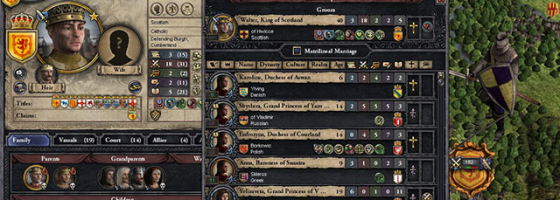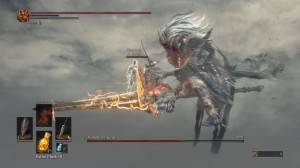Trending
Opinion: How will Project 2025 impact game developers?
The Heritage Foundation's manifesto for the possible next administration could do great harm to many, including large portions of the game development community.
"Depth" in video games is often confused with complexity, but in this post I want to talk about the difference between the two in relation to game design.

Over the last decade with the increase focus on rogue-like design, there has been a misunderstanding by gamers over depth and complexity. Many gamers feel that complexity and difficulty automatically make a game better or deep. I believe we can come up with an accurate definition of what it means to have depth in game design.

Crusader Kings 2 (Kotaku)
Video Games have always had some measure of a learning curve. The "Gamer Tax" associated with the hobby has ebbed and flown over the years. During the last decade, major steps were taken to standardize control schemes and design to reduce the learning curve a game.
For mainstream genres this has come very easy, but genres like fighting, strategy and RPGs are still a tough nut to crack. Not helping matters are the hardcore base that these games are aimed at; who has fought against streamlining and standardization by saying that it will "dumb things down."
We have talked many times before about the fact that difficulty is not a true measurement of a game's quality. It's easy to make a hard game (no pun intended), but it's another job entirely to make something that keeps the player interested in playing. And with that said, I want to talk about my definition of depth in game design.
Finding the depth in a video game is the same as figuring out what makes your game engaging to play. From that, here's my working definition of depth in game design --
Depth -- The number of viable options at any given moment while playing a video game.
As we've talked about, many fans will associate complexity with depth, but that doesn't work for me. If all your options and complexity can be boiled down to only one or two viable options, then your game isn't that deep.
We've talked about the idea of false choices before, and the philosophy holds true here. Making a RPG with 200 classes, 5,000 weapons, and 30 different races to choose from doesn't magically make it a deep game; especially when only a handful of them are viable to play with.

Dark Souls 3
The Souls series is not complicated to understand, but does have a high skill ceiling neverthelessDifficulty by itself also doesn't mean depth. I've been watching people play Kaizo Mario levels. If you don't know what that is, Kaizo in the mainstream refers to very demanding custom levels.
Watching a play of them, they require technical skill to perform the required actions, but they're not deep. Beating a level requires you to play the level exactly as per the designer's order.
There's no thought or ability to adapt on the player's side; you either follow directions or fail. With that last sentence, it's time to strike some nerves.
Trying to open up Esports and competitive games to a larger market has been an uphill battle for designers. Many hardcore fans feel that there is a fine line between accessibility and simplifying what made these games popular.
To me, a lot of what competitive gamers feel are integral to the competitive experience is just complexity and not depth. Memorizing complicated button combos is a technical skill, but it doesn't make your game deep. The same goes for building a deck in a CCG or getting your APM high for a strategy game.
What all those have in common is that there are no choices on the player's part. Being able to memorize combos doesn't require thought. With CCGs, given enough money and the internet, anyone can put together a competitive-level deck. The reason is that whenever there are a fixed number of choices, there will always be superior options.
The major philosophical point and what the Esports community will need to decide is this: Where is the skill and depth supposed to be for an Esports? In my opinion, the depth comes in applying your understanding of the game against an opponent.
There is a big difference in a fighting game between someone who has memorized every combo in the game, and someone who can read their opponent and know how to react and perform against them. Similar to my thoughts on Free to Play and Pay to Win design, just because someone has bought the best items or has the best character shouldn't replace or downplay someone's skill.
If someone can't remember button combos or special moves, but is a master at reading the opponent and situation, can they reach the professional level of a fighting game?
Depth in game design is all about making the player active in playing the game. When all decision making has already been decided, what's going to keep someone playing? For you reading this right now: Can you think of games that are very simple to play, but offer a lot of depth?
Read more about:
BlogsYou May Also Like